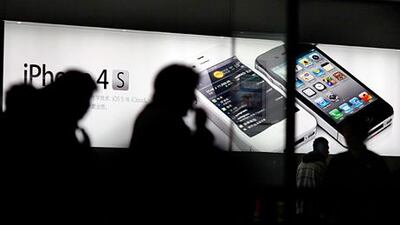The Apple iPhone, until now the undisputed leader in the global smartphone market, is already starting to lose its appeal with consumers in sophisticated western markets.
A lack of innovation for the iPhone since the death of Steve Jobs, an Apple co-founder and former chief executive, is allowing rival brands such as Samsung and Nokia to steal a march. The latest Apple smartphone, the iPhone 4S, is widely said to have offered too few new features.
Tim Shepherd, a senior analyst at the research firm Canalys says the iPhone 4S is not competitive in the way that previous iPhones have been. "Until a new release kicks the proposition on again, there is a clear window of opportunity for competing vendors to attract iPhone customers away."
Manufacturers in Asia have already started to take advantage of the lull in Apple's reputation for innovation and devise products of their own capable of matching, and even surpassing, Apple's most recent offering.
"Samsung's Galaxy S III and HTC's One X products represent attractive, top-of-the range, feature-rich handsets that are available today, while the next generation iPhone launch remains a couple of months away by best estimates," says Mr Shepherd. "Such high-profile products will undoubtedly have lured some customers away to try something new."
Even loyal Apple users will be disappointed if the next incarnation of the iPhone does not deliver sufficient enhancements to justify its high price in comparison with rival smartphones.
Although Apple keeps all future product launches under wraps and ruthlessly pursues any information security breaches, it is unable to keep such a tight grip on its suppliers. The latest reports from the Far East suggest that the new iPhone may do little more than provide a sleeker body, a slightly larger screen and a better camera.
But even if Apple does manage to pull a rabbit out of its hat with the next iPhone, it may be too late to win back some of the customer loyalty it has already lost to rivals.
Even in sophisticated western markets there are reports that Apple is losing ground. According to uSwitch, a telecommunications company based in the United Kingdom, when the Galaxy S III was launched in May, it swiftly rose to the top slot, relegating Apple to second position.
A major problem for Apple is that once its loyal customers have moved to other often much less expensive smartphones, winning them back may be hard.
The sector has already entered a new era of commoditisation with the introduction of smartphones from Chinese manufacturers such as Huawei and ZTE priced at about US$150 (Dh550) each.
Furthermore, Apple smartphone customers may also not be as loyal as the company hopes.
The days of the company individually welcoming new users of its equipment to the "Apple community" are past. Unlike previous generations of Apple-Mac computer users, most of today's iPhone users did not buy their Apple products as a semi-idealistic alternative to a computer sector dominated by Microsoft software.
Smartphone users willing to pay a high price for Apple's iPhones are tempted by two things: the device's fashionable design and Apple's apps store, which delivers internet services far faster and more efficiently than the traditional smartphone internet connection.
Charles Golvin, an analyst at the international research firm Forrester, says "the launch of the iPhone 4S, iOS 5, and iCloud has implications for product strategists at Apple's competitors and for mobile operators, content and application providers".
However, the rapid development of Google's Android smartphone software and manufacturers outside the United States developing their own applications services may make new users reluctant to stump up the price of the latest Apple.
Market logic would dictate that Apple start to cut its notoriously high profit margins and pass on to its customers some of the savings it makes by outsourcing much of its production to the developing world. But the rapid growth of the smartphone market may tempt the company to try to continue to dominate the smartphone market's fashionable end.
Thomas Husson, another Forrester analyst, says "the European mobile market will continue booming in the next five years. Forrester expects smartphone and mobile internet penetration rates to reach 67 per cent and 54 per cent, respectively, by the end of 2016".
It has been estimated by some industry watchers that by 2014, 90 per cent of mobile-phone users will have little option but to own smartphones, even if all they want to do is make phone calls.
If the post-Steve Jobs Apple fails toimprove what iPhones can do, it will have to rely on a relatively small segment of the mushrooming global smartphone market.
The company will soon face the stark choice of being a high-fashion niche brand or adapting to compete with manufacturers from countries such as China.

